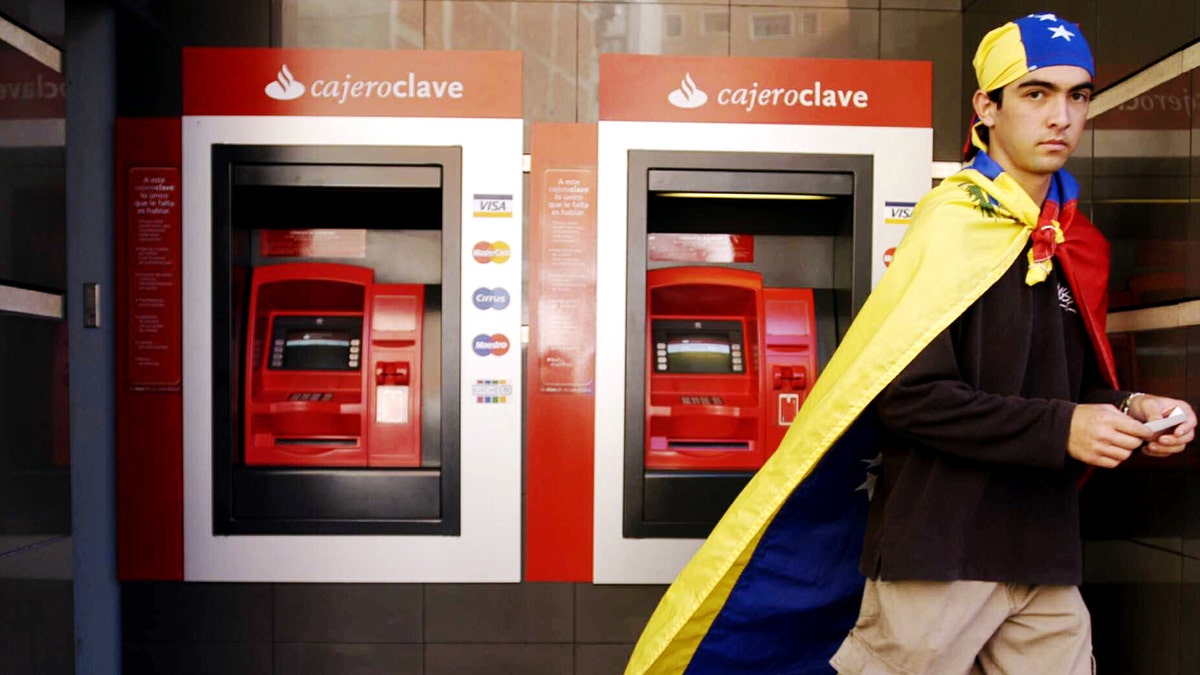
CARACAS, VENEZUELA - A Venezuelan resident walks away from an ATM at a bank on January 9, 2003 in Caracas, Venezuela. An official with the Venezuelan Bank Association said the strike forced 70 percent of bank branches nationwide to close due to the nation wide two-day bank strike. (Photo by Susana Gonzalez/Getty Images) (2003 Getty Images)
A new World Bank report paints a stark portrait of the business climate in Venezuela while looking optimistically at neighboring Colombia, as well as Mexico and even Guatemala.
Out of the 189 countries studied for their ease of doing business, Venezuela came in close to the bottom, at 181. The only countries in the world that are worse for business investors are war-torn nations like Libya, South Sudan and the Democratic Republic of Congo, according to the World Bank’s Doing Business 2014 report.
Since the presidency of late President Hugo Chávez, Venezuela has struggled with rising inflation rates, a struggling economy and a faltering oil despite having the world’s largest oil reserves. These problems have only been exacerbated since Nicolás Maduro took over power following Chavez’s death earlier this year.
The dire economic situation in the OPEC-nation has led to widespread protests and a growing opposition to the idea of 21st Century socialism championed by Chávez. Since 1998, Venezuela has seen an expansion of many social programs and health services to the poor that buffeted support for the Chávez and Maduro governments, but the economic issues have hampered Maduro’s base of support and his staunch anti-American stance is beginning to lose gravitas as inflation rises.
“Maduro is quickly discovering that the reality of Venezuela's capsizing economy cannot be indefinitely explained away as an American plot,” said Leopoldo Martínez, CEO of the Center for Democracy and Development in the Americas, in an opinion essay for Fox News Latino.
“As long as Maduro remains in power, Venezuelans can expect to lose the two things they hold most dear: their constitutional democracy and their economic sovereignty," Martinez wrote.
On the opposite side of the business spectrum, according to the World Bank report, is Colombia, which sits 43rd on the list behind the rapidly expanding economy of Peru. A number of policy reforms implemented since 2005 and a lessening of violence related to both the drug trade and the country’s ongoing civil conflict have helped make Colombia one of the more appealing nations in Latin to do business.
The government of President Juan Manuel Santos has also made sustained efforts reduce the bureaucratic processes to open a business, pay taxes along with increasing exports and foreign trade.
“Colombia is at its prime for foreign investment,” said Juan Carlos González, vice president of investment for Proexport, the Colombian government agency for trade, investment and tourism, told the International Business Times. “In 2012, we received an investment of $15 billion, a record for us. And we intend to keep attracting foreign companies to our shores.”
While Guatemala was only ranked 79th on the list, the World Bank listed the Central American nation in the top 10 of countries that made the most progress in policies in the last year. Easier tax filing systems and moving many antiquated procedures online – such as construction permits and business registration – were just two of the moves the administration of President Otto Pérez Molina made in the last year.
World Bank officials seemed hopeful that the country would continue to make strides, which could ultimately help the country's poor and create more small-to-medium-size businesses.
“The country would therefore help in creating more legitimate jobs and reducing poverty,” said Óscar Avalle, World Bank representative in Guatemala.
Latin America’s second largest economy, Mexico, made the list at 53rd, but analysts believe that the police reforms being pushed for President Enrique Peña Nieto will see the country’s stock rise in the coming years. One of the biggest reforms under Peña Nieto is his proposal to open the country’s state-run oil company, Pemex, to foreign investors.
Peña Nieto claims that Pemex’s outdated and poorly maintained equipment is hindering the country’s chances of dredging up oil in the deep waters in the Gulf of Mexico. Pemex can currently detect where the deposits of oil are, but does not have the proper equipment to drill. The Mexican leader has run into opposition from opponents who see the aging business as a poignant symbol of the country’s independence.
“Enrique Peña Nieto has the political capital and votes in congress to put through a constitutional change to break the monopoly of Pemex and allow foreign oil companies to look for oil in the deep Gulf waters,” Duncan Wood, the director of the Mexico Institute at the Woodrow Wilson International Center for Scholars told Fox News Latino in August.
The United States continued to be one of the best places in the world to do business, according to the list.
The country ranked fourth overall on the list behind Singapore, Hong Kong – so-called special administrative region of China – and New Zealand.
Follow us on twitter.com/foxnewslatino
Like us at facebook.com/foxnewslatino




















